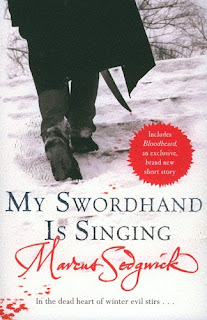I've come late to vampires. Maybe I've become braver as I approach middle-age, maybe being scared of things that go bump in the night just takes up too much energy. Whatever it is, I no longer hide behind the sofa at the sight of a roving fang or a pool of spilt blood on the TV, or under the bedclothes at the mention of a silken cloak or a white face rising out of a coffin. However, My Swordhand is Singing is not about the modernised, almost civilised vampires we have come to know from recent 'dark fiction', nor is it in any way, shape or form related to the goodie-goodie vanilla vampires of Twilight. It is from a much much older and darker tradition than that. Some time ago (long before the current vamp-craze) I did some research into the Eastern European legends of the Moroi and other night creatures for a book I was then writing. Marcus too has delved deep into those stories, and his book conjures that aura of raw terror which is what all the best old monster legends are made of.
Peter and his father Tomas, both woodcutters, are newly-arrived outsiders in the village of Chust. Tomas is drunken, secretive, violent--and Peter doesn't understand many of the things his father does, including why he has dug a channel so that their hut is surrounded by running water. Chust is a closed, suspicious village--and it is riddled with the undead, who rise from their graves and infect the whole community. This is certainly a Gothic horror story--but it is much more than that. Marcus delineates his characters with care and skill--and the sub-plot (equal in importance) which runs alongside the thrilling main story of the rise of the Shadow Queen is that of a father-and-son relationship full of terrible loss and also of a kind of sorrowful, elegaic redemption. It's one of those stories where you long for it to come all right in the end, even though you know it can't. I stayed up all of one night reading--and no doubt I shall stay up on another when I read the sequel, The Kiss of Death. Highly recommended for weaning teens off saccharine vampires, and for all who like good writing and a damn fine story.
Here's Marcus's answer to my usual
BURNING QUESTION
MS: The short answer is yes, hawthorn is one of the more magical woods in many European traditions, and I found it enjoyable seeing these things blurred and spread across various folk traditions, including that of the Transylvanian vampire lore. Incidentally, the apparent 'practical' origin of the thorn was that it would pop a bloated corpse, thus taking away some of its apparently evil manifestation.
SCC: Thanks, Marcus. I somehow know that that idea of popping a bloated corpse is going to stay with me for some time.




























